The institute intentionally and strategically increases emphasis on developing the knowledge, skills and capabilities of the next generation of water and food leaders. We help create a pipeline of talented professionals, while also building capacity in relevant industries and other stakeholder and partner organizations. In collaboration with colleagues across the University of Nebraska System and our external partners, we develop mission-relevant education and professional development opportunities.
Education and capacity building
Eleven new students receive DWFI funding in 2024-2025 academic year

In the 2024-25 academic year, DWFI funded 11 new University of Nebraska students and their research related to water and food security, each under the guidance of DWFI Faculty Fellows. This brings the total number of supported students during the 2024-2025 academic year to 28. DWFI supported students participate in a fall welcome event and share their research at the annual Water for Food Student Research Forum held in the spring each year.
Since it was initiated in 2014, the Daugherty Water for Food Global Institute’s student support program has made more than 132 awards to DWFI Faculty Fellows supporting postdoctoral, graduate and undergraduate students on all four University of Nebraska campuses and invested $4.9 million, of which $4.2 million has been matched one-to-one by faculty. The awards provide stipends to students working on projects that contribute to the institute’s mission to have a lasting impact on achieving more food security with less pressure on scarce water resources. Below are just a few of the highlights from the work of DWFI supported students and their DWFI Faculty Fellow Advisors.
- DWFI student project directly informs new legislation under consideration by Chilean Congress
Chile is in its fifteenth consecutive year of drought, with hydrological deficits of 30-70%. With agriculture accounting for 73% of national freshwater withdrawals, there is an urgent need to find alternative water sources for agriculture that are safe, sustainable, and economically viable. The reuse of domestic greywater (wastewater from laundry, showers, and sinks), has been identified by the Chilean Agency for Food Safety and Quality (ACHIPIA) as a promising option for smallholder horticulture.
Regulatory approval has been hindered by limited quantitative evidence on microbiological risk, which is critical to ensure safety for crops, farmers and consumers. To close this gap, a DWFI Graduate Student Fellowship was awarded in 2024 to Andrew Stiven Ortiz Balsero to partially support a collaborative project led by the University of Nebraska–Lincoln (UNL) Food Safety Risk Assessment Group, in collaboration with ACHIPIA. Balsero’s advisor is DWFI Faculty Fellow Bing Wang from UNL’s Department of Food and Technology Department.
The three year project will develop, validate, and translate quantitative microbial risk assessment (QMRA) framework that enables Chilean authorities and growers to evaluate food safety risks associated with greywater irrigation of fresh produce and to design evidence-based mitigation strategies.
The first year has focused on the development and validation of a comprehensive production-to-retail QMRA model for generic E. coli on lettuce, assessment of the suitability of using greywater for irrigating lettuce, and identification of potential intervention strategies for the safe reuse of greywater. A report was completed in December 2024 highlighting several key considerations for reusing greywater in agriculture. The report found that untreated greywater is unsuitable for irrigation without proper treatment; the country’s wetland systems are sustainable, energy efficient, and meet international safety standards; and a multi-faceted risk management approach can support water conservation and food safety in Chilean agriculture.
This was the first case in Chile where a risk assessment has directly informed the development of new legislation, specifically, a bill on greywater reuse for agricultural irrigation under consideration by the Chilean Congress.
- Teaching Cameras to Map Water and Vegetation
The U.S. Geological Survey (USGS) currently uses a network of cameras for water resource monitoring, but would like a process for identifying and measuring both water and vegetation surfaces based on the imagery. DWFI supported student John Stranzl is working with DWFI Faculty Fellow Troy Gilmore to develop software that will do just that — the GaugeCam Remote Image Manager - Artificial Intelligence (GRIME-AI).
USGS already uses GRIME software, and Stranzl is developing a GRIME-AI update to segment imagery into “water” and “not water” identifiers and automatically and accurately distinguish these water surfaces within image scenes. The program will eventually be used in the approximately 400 cameras used in the USGS network. An update for vegetation greenness will be added to the project over the long-term.
GRIME-AI’s ability to identify water and vegetational landscapes within an image enhances USGS’s ability to learn the locations of water bodies like streams, lakes and rivers. This data helps USGS assess water availability and identify areas facing potential shortages. Monitoring of streamflow and groundwater levels also provides crucial information for managing water resources, ensuring adequate water for human consumption, agriculture, industry and environmental needs.
- Expanding Access to Water-Saving Irrigation Technology
Variable Rate Irrigation (VRI) is a precision agriculture technique that applies water at varying rates across different zones within a field. By tailoring irrigation to specific areas, VRI optimizes water use and can help increase yields. This site-specific approach addresses field variability and improves water-use efficiency, making it a key advancement in modern irrigation practices. However, adoption has been slow, largely due to high implementation costs and management complexity.
DWFI supported student Joseph Oboamah is working with DWFI Faculty Fellow Xin Qiao to test and develop a new, partial VRI system designed to be both cost-effective and easy to integrate into existing center pivot irrigation systems.
From 2021 to 2023, the research team partnered with industrial equipment supplier KZValve to create a working prototype. Building on its success, the current phase focuses on refining hardware and software components, designing a user-friendly interface, and conducting field trials with Nebraska producers.
This system is unique because of its self-powered design, which uses hydraulic energy. Its standalone control capability allows producers to target water application precisely, without the expense of replacing their entire irrigation system.
By pairing innovative engineering with practical, affordable solutions, this work could expand access to precision irrigation, helping Nebraska producers conserve water and improve crop yields.
- Monitoring Ecosystem Health after AltEn Agrochemical Spill
DWFI supported student Shabani Muller worked with DWFI Faculty Fellow Elizabeth VanWormer to investigate agrochemical contamination in wildlife following a leak at the AltEn ethanol plant in Mead, Nebraska. The project seeks to protect public and animal health by pinpointing when and where wildlife are exposed to pesticides, using certain species as environmental “sentinels” to signal potential risks.
By analyzing biological responses in a range of aquatic, amphibian, and avian species near the AltEn site, the team is assessing exposure to neonicotinoid insecticides and fungicides. The research has three main focuses:
● Bullfrog tadpole contamination surveillance
● Native tadpole health impacts and chemical burden
● Songbirds as terrestrial indicators of agrochemical exposure
While they continue to receive pesticide testing results, preliminary results demonstrate that tadpoles and songbird eggs are effective indicator species for the detection of agrochemical pollutants in the aquatic and terrestrial ecosystems surrounding the AltEn facility. This work directly enhances understanding of how pesticide contamination in surrounding aquatic and terrestrial environments can result in exposure for both wildlife and humans.
Findings from this work will be shared through classroom instruction for undergraduate and graduate students, as well as with community stakeholders and policymakers involved in environmental health and agricultural policy. The project is expected to result in at least two peer-reviewed publications.
- Testing Biochar to Improve Soil Health and Water Quality
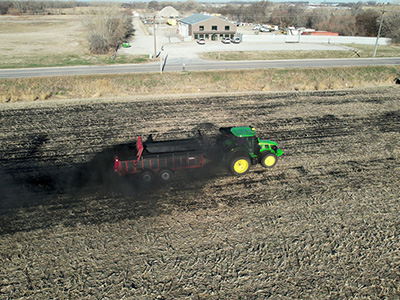
Biochar and biosolids were applied to a field in the Lincoln area as part of this experiment
Credit: Nebraska Water Center
DWFI supported student Britt Fossum is co-advised by DWFI Faculty Fellow Michael Kaiser and the Nebraska Water Center’s Arindam Malakar, and receives support through the Claire M. Hubbard Water, Climate and Health Fellowship. Fossum is studying how biochar—a carbon-rich soil amendment—can be paired with biosolid fertilizer to support sustainable farming and protect Nebraska’s water quality.
In field trials, Britt compared different fertilizer and biochar treatments, measuring soil nutrients, water retention, carbon storage, and potential contaminants. Results show that biochar helped soils hold more nutrients and water without reducing crop yields, and a one-time biosolid application did not increase harmful substances in the soil or crops.
This research helps inform how biochar can be used at scale to improve soil health, conserve water, and improve water quality in corn and soybean systems.
Irrigation Summer Field Course An experiential learning approach to sustainable water management
The University of Nebraska–Lincoln's (UNL) Irrigation Summer Field Course provides students with hands-on experience in irrigation and water management, combining instruction with practical field activities like digging trenches for irrigation furrows and visiting manufacturing plants. Established in 2012 by DWFI and UNL's Department of Biological Systems Engineering, the course is offered every two years and was last taught in 2024 by DWFI Faculty Fellow Derek Heeren. It attracts students globally, offering insights into various irrigation technologies and the broader agricultural system. Participants learn about water management from source to user, interact with Nebraska's Natural Resources Districts, and gain practical skills beneficial for implementing sustainable water management technologies in their home countries. The course emphasizes experiential learning and fosters creative problem-solving in collaborative teams, helping students transition from theoretical knowledge to becoming confident irrigation specialists.
-
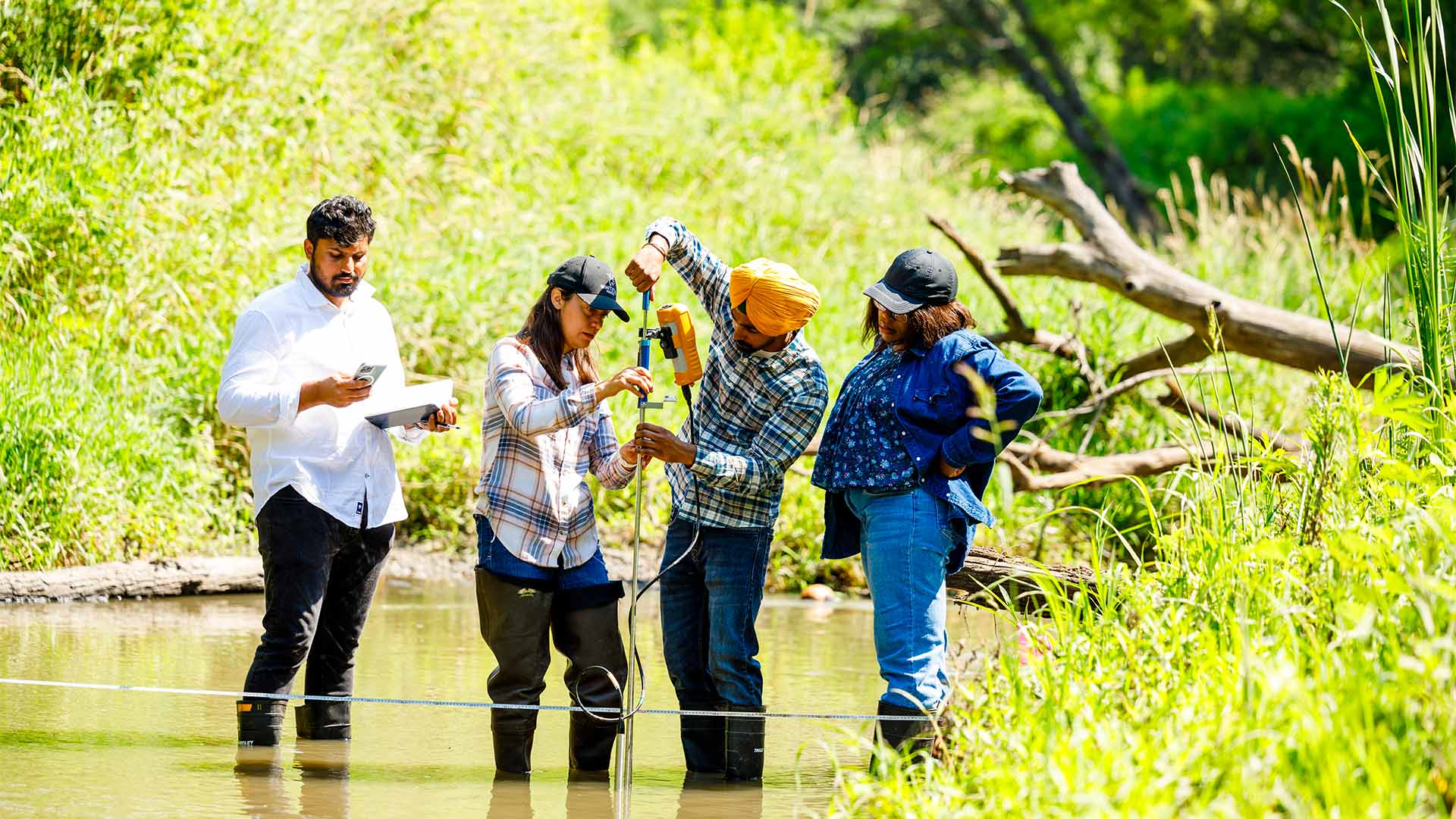
Participants in the irrigation summer field course. Credit: DWFI.
-
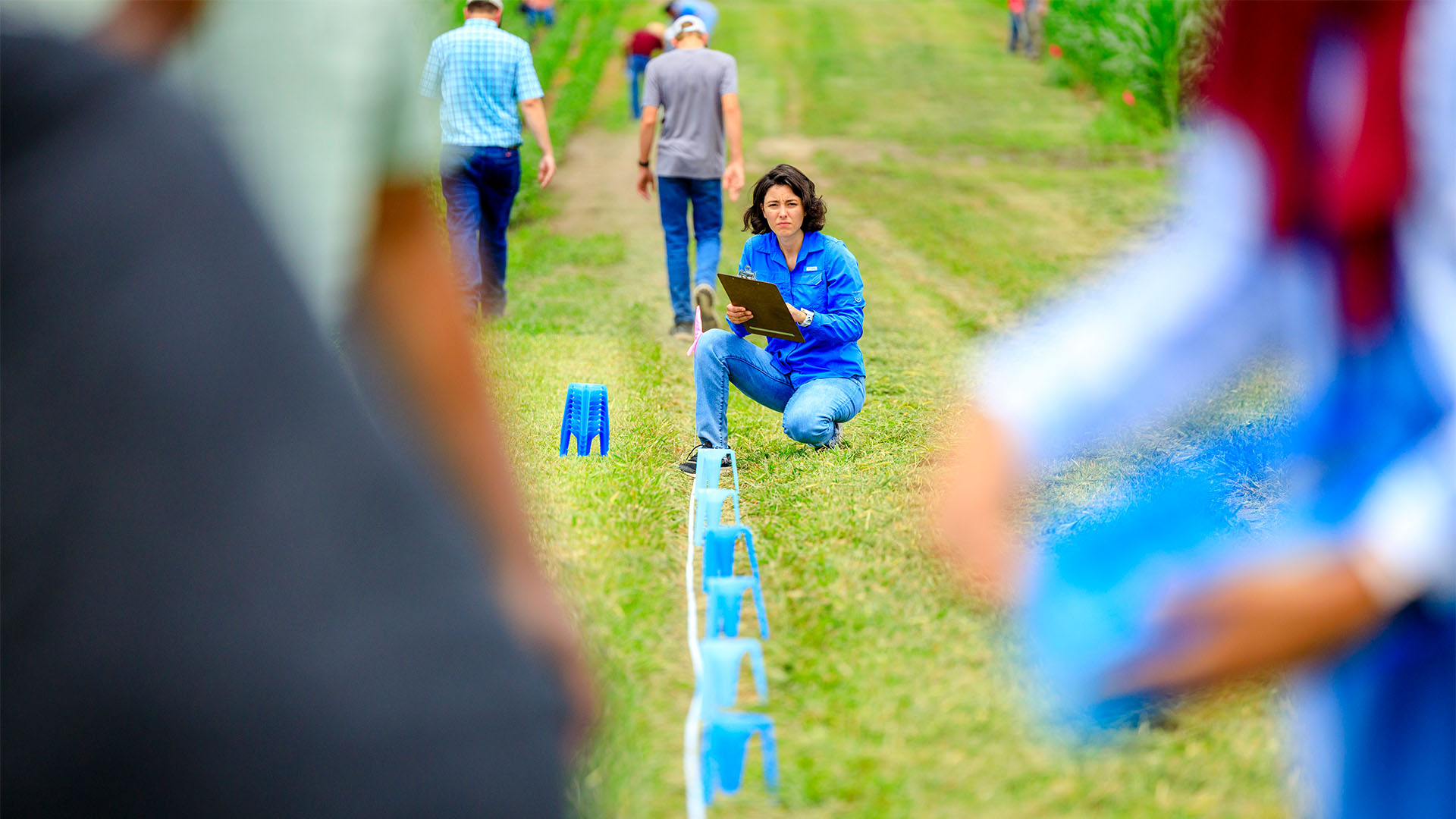
Participants in the irrigation summer field course. Credit: DWFI.
-
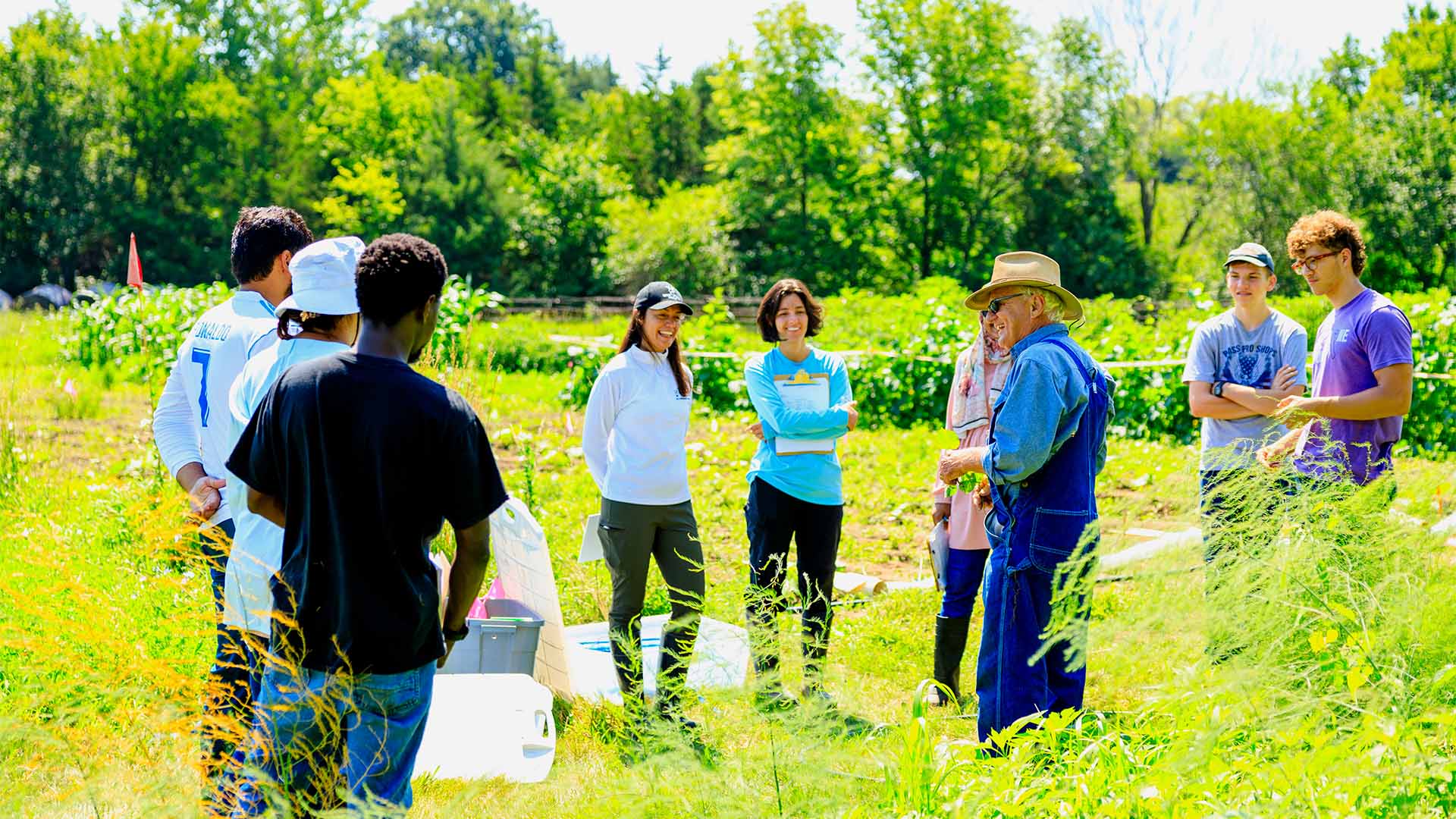
Participants in the irrigation summer field course. Credit: DWFI.
-
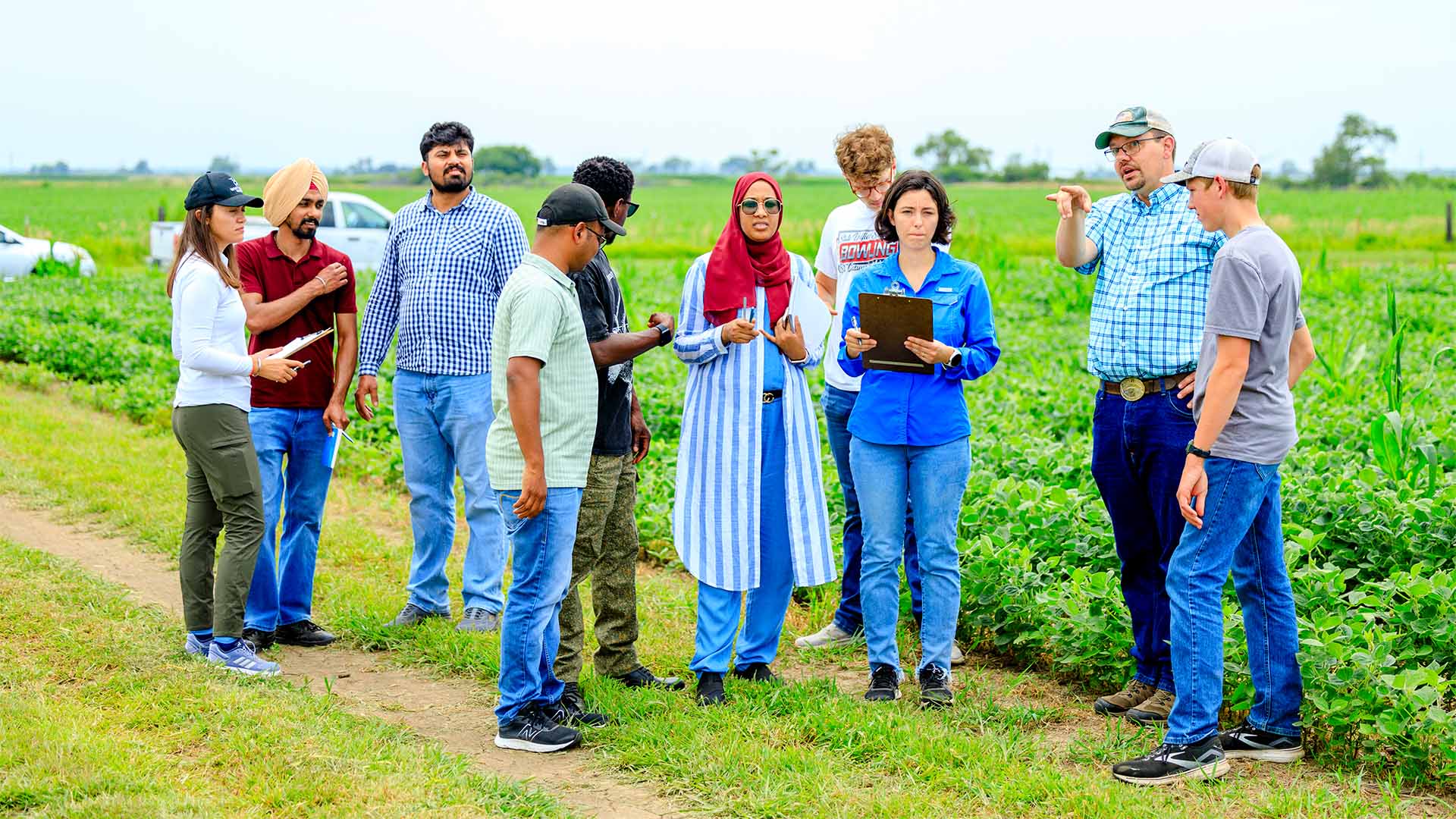
Caption: Participants in the irrigation summer field course. Credit: DWFI.
Collaboration with Yuetter Institute provides immersive trip to Ghana for students
DWFI collaborated with the Clayton Yeutter Institute of International Trade and Finance at the University of Nebraska to provide Yeutter Student Fellows with a spring break experiential learning opportunity in Ghana. Four undergraduate Yeutter Student Fellows traveled to Ghana to gain firsthand experience of the country's agricultural and irrigation challenges. This immersive trip was part of a research project for Valmont Industries, a Nebraska-based irrigation company, to determine potential future market opportunities. The students were selected for the Yeutter Student Fellows program to develop their skills in international trade policy.
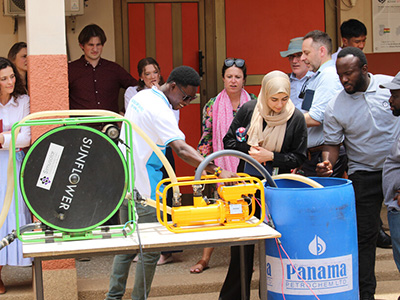
During their time in Ghana, the students met with farmers, equipment dealers, university students and faculty, government agencies, and researchers to better understand agricultural value chains in the country. They observed demonstrations of solar-powered water pumps, visited farmers’ fields, and discussed food and water security. This experience was a key part of their research project for Valmont and helped them develop their final recommendations. DWFI Director of Policy Nick Brozović and DWFI Senior Program Manager Renata Rimšaitė assisted in leading the trip and mentoring students. As a result of this experience and their interactions with DWFI, two of the Student Fellows are now interning at the institute.
Nebraska Master Irrigator hosts Design Summits
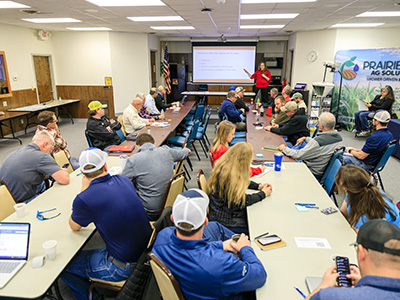
DWFI supported the University of Nebraska’s launch of Master Irrigator, a producer-directed comprehensive educational series focused on taking irrigated acres to the next level. A series of Design Summits were hosted across Nebraska to bring together farmers, industry, extension, and policy partners and were led by Crystal Powers, DWFI water and cropping systems extension educator. The summits provided discussion around educational needs across four key themes:
- Taking your irrigated acres to the next level
- Taking your soils to the next level
- Protecting Nebraska's soil & water
- Transforming data into decisions
Three sessions crossed the state to share previews of different topics and gain insights from different regions about key issues affecting Nebraska’s irrigated cropping systems. Ninety-eight participants joined in the discussion, providing hundreds of suggestions. Nearly nine out of 10 participants said they will take action on what they learned through the Summit.
Master Irrigator is forming an Advisory Team to work in partnership with the existing team to create the full curriculum for 2026. The team plans to preview and host hands-on sessions in the Northeast and Panhandle during the summer of 2025. Industry partners are key to the program success and the following panelists provided insights: Arable, Bish, CropX, Delta Plastics, Komet, Lindsay, Nelson, Prairie Fire Ag Solutions, Reinke, Senninger, Sentinel, Valley, T-L Irrigation. Partners also included USDA-NRCS, four Nebraska Natural Resources Districts, the Nebraska Department of Environment and Energy, the Nebraska Department of Natural Resources, the Nature Conservancy Nebraska, and the Nebraska Corn Board.
DWFI facilitates field trip to West Central Nebraska for international irrigation startups
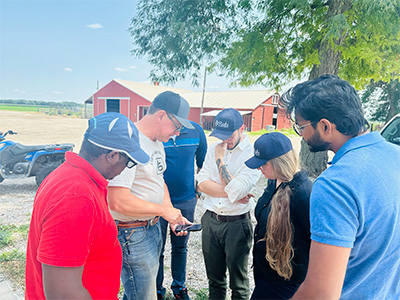
DWFI catalyzes and supports agtech solutions in a variety of ways, including showcasing Nebraska agriculture to stakeholders. DWFI hosted a field trip for two international agtech startups, AgInfinity and Raks Technologies, as part of Invest Nebraska’s AgTech Connect conference. The goal of the tour was to help the startups understand Nebraska’s agricultural landscape and agtech adoption potential. The startups met with the UNL-TAPS and N-mobile irrigation testing lab program teams to learn about university resources for testing and validating their products. They also met with a grower to learn about the challenges faced by growers and the potential for agtech adoption. The tour highlighted the importance of local partnerships and university collaboration in agtech adoption.
WARI Program Resumes Fostering US-India Water Research Collaboration
The Water Advanced Research and Innovation (WARI) Program, a collaboration between the India Department of Science and Technology (DST), the government of India, the University of Nebraska-Lincoln (UNL), and the Indo-U.S. Science and Technology Forum, has resumed. The program is partially led by DWFI and connects Indian students and early-career faculty with U.S. university faculty for three to twelve months of water-related research. WARI aims to produce impactful research, build international professional networks, and develop water research careers.
Originally active from 2016-2019, WARI paused during the pandemic. Applications reopened in late 2024 for the 2025 cohort, selecting five students and five fellows. These participants began arriving in the U.S. in April 2025, with placements at UNL (three interns, three fellows), the University of Texas at Austin (one intern), the University of Idaho (one intern), Texas Tech University (one fellow), and Purdue (one fellow). Additionally, U.S.-based students and early-career faculty were selected in May 2025. DWFI Faculty Fellow Jeffrey Westrop and Kaitlyn Richards, a Nebraska Water Center graduate student, will each conduct research in India for several months from late 2025 through March 2026.
Education and capacity building
- Irrigation Summer Field Course: An experiential learning approach to sustainable water management
- Testing micro-credential courses to offer new opportunities for learners and instructors
- Special Seminar: Deep Learning and Geospatial Techniques in Agriculture Management
- Irrigation Innovation: Educating the Next Generation of Conservation Advocates
- Nebraska Master Irrigator Program to Equip Growers to Lead Irrigation Innovation
- DWFI facilitated a field trip to West Central Nebraska for international irrigation startups
Top image caption
Participants in the irrigation summer field course learn from DWFI Faculty Fellow Dean Eisenhauer.
Credit: DWFI
COOKIE USAGE:
The University of Nebraska System uses cookies to give you the best online experience. By clicking "I Agree" and/or continuing to use this website without adjusting your browser settings, you accept the use of cookies.

